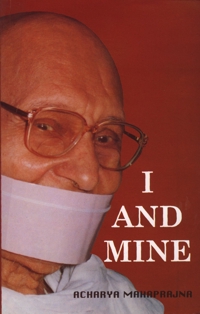
According to some people being simple and straight in these days is not useful. On the other hand, I consider straightforwardness is an eternal verity. It is always useful. One can have no peace of mind without it. Those regarding it useless forget that straightforwardness is not the same as foolishness. Being simple does not mean being a simpleton. Some words have become ossified and they need to be changed.
Jainendra: Popularly the word Sadachar meaning 'good conduct' is used. But Samachar meaning 'observance' is not adequate. It should be Satyachar (truthful conduct). Good conduct is a socially accepted topical policy. If religious conduct too was confined to il. the much-needed revolution will not come from religion. Therefore, religion should go deeper than that. Words like peace, tolerance have also become similarly fossilized.
| Muni Shree: | In the word Sadachar is included sat, which also denotes 'truth'. Sat and Satya are the same. With changing times it came to include another denotation also. Sadachar did not remain merely Satyachar (truthful conduct) but also came to mean ‘good conduct'. Linguistically speaking words keep degenerating and rejuvenating. |
| Jainendra: | Satyachar (truthful conduct) will manifest itself in a manner different from the present day Sadachar (good conduct). |
| Muni Shree: | It is true. The connotation can change if Sadachar is changed and another word substituted. |
| Jainendra: | 'Reaction' and "Escape' are two words widely prevalent in literature. I am called an escapist. I wonder who would not try to escape in the face of a bull. |
| Muni Shree: | Every word has the same plight. No word is free from rejuvenation, degeneration, rise and decline. Two to two and a half thousand years ago the word Pashand denoted an ascetic. It has been used honourably in the stone inscriptions of Ashok and in Jain and Buddhis t literature. Today, it has acquired a despicable denotation. It sounds unpleasant. |
| Jainendra: | The word Asur |
| Muni Shree: | In ancient literature Asur meant a god. Even Yaksha denoted importance. Today, it is different. Today Sahasik |
| Muni Shree: | A word is the creation of both an idea and an action. In itself a word has no power; it is merely an indicator. A glorious act makes a word dignified. If the act is feeble, the power of the word is also enfeebled. The word Raja (king), which once meant God, has not more than historical significance in the present because the decline of regal action made the term unpleasant. |
| Rajendra: | Do actions owe themselves to society or to thinking? |
| Muni Shree: | Every action first appears in the form of thought. Behavior is a reproduction of thought. Thought and action are causally related. But thoughts develop within a social context. Therefore, it can be said that society enables the birth of thought and thought enables the birth of action. |
| Rajendra: | Is thought a cause of social action or vice versa? |
| Muni Shree: | Social events give rise to thoughts, which in turn produce actions. |
| Rajendra: | The thoughts in us have come into existence as a reaction to external events. Therefore, they are not active but reactive. For example, the answer to a mathematical question may be unique, but it is, as it were, a slave to the question. |
| Jainendra: | What he is saying is that man is not the Master of his thought, but its subordinate. |
| Muni Shree: | The answer is born only after the question; therefore it is natural for it to be dependent on the question. But what occasions a thought is not merely a question, but also his inherited traits and external reaction: Why does a thought appear in the mind? Because you carry your own genetic traits. Every thought leaves behind some reaction. What we think today the traces of its reaction outlast the thought. That is why we can recollect it. External circumstances also influence it. |
 Acharya Mahaprajna
Acharya Mahaprajna






